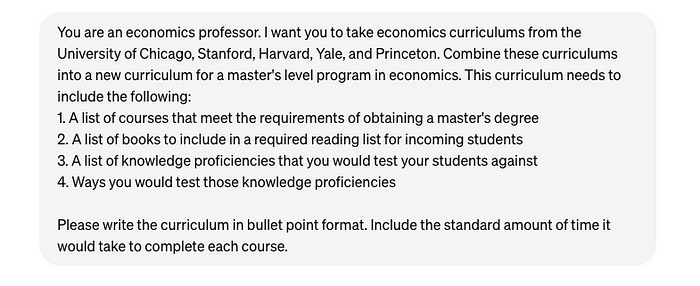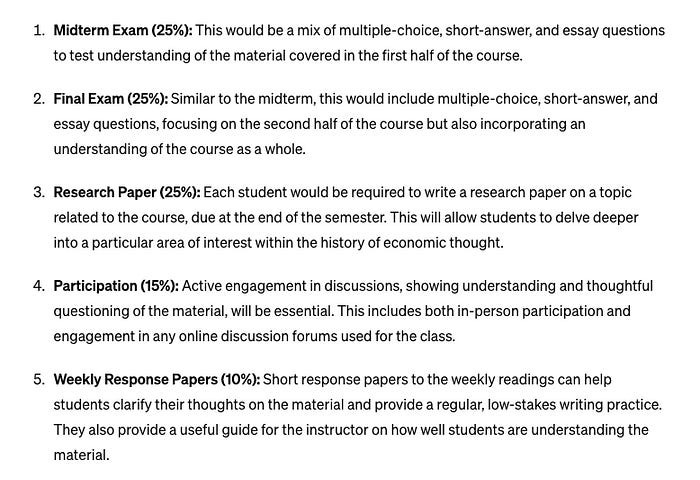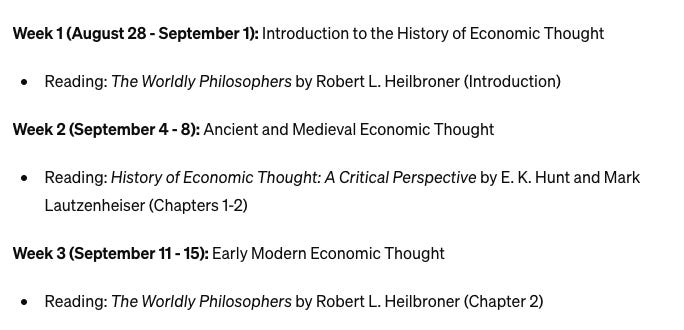Can You Use ChatGPT Instead of Going to Grad School? I’m About to Find Out.
Is it possible to leverage new AI-powered tools to produce the same outcomes that traditional education once did?

I love to learn. As you can imagine, I did well in school.
Most people thought I’d probably go on to get my master’s. One professor even encouraged me to get my PhD.
The truth is I wanted to but I never did.
In 2017 I took the GRE and submitted my grad school applications. I ended up getting into a top program for political science at an Ivy League school.
With less than a week to fork over a $700 deposit, I decided not to go. I couldn’t stomach the idea of more than doubling my student loan balance only to reenter the job market a couple of years later with a negligible return on my investment.
A degree doesn’t guarantee a salary after all.
To be fair, there are a number of career paths that do require you to get an advanced degree. Dentists, doctors, lawyers, teachers, and engineers are a few that come to mind.
Political science? Not so much.
In my old career in Washington, DC, I observed that an advanced degree was nothing more than a credential. It wasn’t used to increase your earnings potential but it was used to gatekeep candidates.
Think tanks are notorious for this. They use trumped up educational requirements to justify the employment of entry-level employees. Why take someone with a bachelor’s degree when you have a pool of newly minted master’s degrees who are willing to work as interns for free?
Having an advanced degree helps, but it doesn’t necessarily make you more competent or qualified to do a particular job. Instead, it’s become a status symbol. Quality of work is assumed when you have junior fellows from the halls of Harvard and Stanford on your payroll to pad your organization’s pedigree and prestige. The work itself is rarely, if ever, evaluated.
While I never got my master’s degree — and likely never will — that doesn’t change my penchant for learning. Artificial intelligence is rapidly changing the game of how people learn and with it, the whole gambit of higher education in general. While YouTube has made it possible to learn anything online, AI-powered tools are making it possible to teach yourself anything.
When you pause to really think about it, that’s a game changer.
Instead of just watching a handful of videos to ingest new information, you can use AI to test your retention of knowledge, giving you feedback in real-time. It can design quizzes, write you a midterm exam, and even grade your performance on assignments. It’s not only possible to become proficient in something, you can now validate your proficiency too.
To understand how AI is going to change the process of learning, I decided to create an experiment for myself. I’m going to self-study my way into getting the equivalent of a master’s in economics.
Using ChatGPT, I developed a curriculum and plan of study. I created a rubric and grading guidelines to measure my success.
The first part of the experiment is completing a course designed by ChatGPT — History of Modern Economic Thought. I’ll follow the syllabus ChatGPT created for me and publish essays on what I learn. By the end, I’ll have a body of work that ChatGPT — and you, dear reader — can evaluate to determine whether or not I pass or fail.
This is the first article in a series of articles that will document this experiment. The goal is to show what I’m doing as I’m doing it. By doing so, I hope to create a replicable process anyone can use to obtain mastery in any skill they want.
The ability to do so will be critical, not just for bypassing college, but for quickly reskilling in a world that is rapidly changing.
To get started, I prompted ChatGPT to develop a master’s of economics curriculum for me.
I’m not a teacher. While I’ve tinkered with developing my own digital learning products — courses and workshops — I’m not formally trained in how to do this.
That’s where ChatGPT comes in. As a hub of knowledge, ChatGPT can play whatever role I prompt it to. For this project, I need it to be a professor.
Professors don’t just teach classes. They build them. Their class syllabus is their intellectual property. They essentially license that syllabus to colleges and universities for a fee. In return, the university provides professors with students to teach.
While some undergrad programs have public-facing syllabi, many do not. This is especially true for graduate programs.
The curriculum at a lot of schools is a closely guarded secret. For my chosen field of study — economics — some schools provide little information about what a student is expected to learn in the course. Harvard, for example, provides a list of core classes grad students are expected to take, but doesn’t provide any details about what’s covered in those classes.
This is where ChatGPT comes in. It has access to a large repository of data that can help fill in the gaps. This can help me develop a full curriculum in a way I wouldn’t otherwise be able to do just by poking around the department websites at top universities.
To begin building my master’s curriculum, I prompted ChatGPT to pretend it was a professor from some of the top schools in economics: Harvard, Stanford, and the University of Chicago to name a few. From there I asked it to come up with a list of courses I should take, books I should read, things I should be expected to learn, and the different ways I could test my knowledge as I obtain it.
The answers ChatGPT provided created a framework or a roadmap for me to follow.
One of the primary values of forking over the cash to go to school — instead of learning on your own — is that your school tells you which courses to take and in which order. You just do what you’re told and your professors evaluate you as you go along. Your studies will generally culminate in a capstone or thesis of some ki,nd which not only validates your knowlede, but also the skills required to communicate and distribute your knowledge in a practical setting.
In this regard, ChatGPT is a disruptor to a school’s natural competitive advantage. It can curate information in a way traditional search engines haven’t been able to. Instead of merely retrieving information, you can prompt ChatGPT to synthesize different types of information to answer your query.
That means ChatGPT can do exactly what I asked it to do — pretend it was a professor and create a curriculum for me. Once I have a framework to work from, I can tailor and adjust it at my discretion to meet my personal learning goals and objectives.
That’s why I think ChatGPT — and other AI-powered tools — are going to radically transform higher education. Once you understand how to work with AI, you can prompt it to be your guide. Traditional professions in higher education that played this role — professors and academic advisors — will now have to compete with tailored and highly customizable chatbots for a fraction of the cost.
After ChatGPT created a curriculum for me to follow, I asked it to lay out a plan of study.
I did a little back and forth with ChatGPT to finalize the curriculum. Once I did that, I used it to fill in the details of how I would learn what I planned to learn.
One of the challenges with embarking on a project like this is that I don’t have the same opportunities for human feedback. There are no lectures for me to ask questions and I don’t have a professor with office hours I can attend.
While this isn’t inherently a bad thing, it can make it harder to actually learn. When there’s no opportunity to assess when you’re wrong it’s hard to grow and develop important skills like critical thinking.
This is where ChatGPT holds the promise of filling this void. Playing the role of my professor and with a bank of teaching experience to rest on, ChatGPT has the ability and expertise to evaluate how I’m doing.
To help me understand the evaluation process, I asked ChatGPT to break down how each course in my curriculum would be evaluated.
I haven’t gotten to a point — yet — where I’m ready for ChatGPT to write a midterm exam for me, but once I get there I’ll report back.
In the meantime, my main focus is on evaluating writing. With weekly response papers and a research paper making up 35% of my total grade, I also needed a way to objectively evaluate my work. I asked ChatGPT to create a simple 5-point rubric for me to follow.
In the coming weeks, I envision feeding ChatGPT this rubric and a finished response paper. I’ll ask it to objectively score it while providing me with feedback on areas where I can improve my writing. That too, will be forthcoming.
Once ChatGPT evaluates my work, I’ll ask it to assign me a grade based on the grading scale it provided me.
In addition to what ChatGPT has provided me with, I’m also adding my own evaluation metric. Considering I’m a writer here on Medium I have real performance indicators at my disposal to evaluate myself. I can use these indicators — reads, Boosts, and earnings — to determine how well I’m doing.
To do this, I’m going to primarily look at the earnings of each essay I write as part of this project. According to Harvard’s Graduate School of Arts and Sciences, one master’s level course costs $7,953. If the cumulative value of my response papers and final essay surpass that, I’ll give myself an automatic A.
With a framework to measure my success, asking ChatGPT for feedback to identify shortcomings, and using readership here on Medium to quantify my success, I have a plan in place to get started.
The first class I’ll be taking as part of my ChatGPT master’s degree is History of Modern Economic Thought.
Once I had all the pieces in place to do a master’s degree, I changed my prompt to have ChatGPT design my first class for me. The class is titled History of Modern Economic Thought which ChatGPT describes as follows:
“While the course on alternative economic thoughts covers some historical ground, a course specifically on the history of economic thought would provide a deeper understanding of the progression of economic ideas over time. It would cover the works of Smith, Keynes, Marx, and many others in more detail.”
Instead of a high-level view of different economic theories, this class should dive into specific details of important economic thinkers and the context in which their ideas emerged.
From this description, I asked ChatGPT to provide me with an outline. It broke the course into 16 weeks, including time to review for midterms.
I also asked ChatGPT to create a reading list for this course. It assigned me the following books:
The Worldly Philosophers: The Lives, Times And Ideas Of The Great Economic Thinkers by Robert L. Heilbroner
History of Economic Thought: A Critical Perspective by E. K. Hunt and Mark Lautzenheiser
The Making of Political Economy: A History of Economic Thought by Robert L. Heilbroner and William Milberg
The Wealth of Nations by Adam Smith
Capital, Volume I by Karl Marx
The General Theory of Employment, Interest, and Money by John Maynard Keynes
Individualism and Economic Order by Friedrich Hayek
Essays in Positive Economics by Milton Friedman
Misbehaving: The Making of Behavioral Economics by Richard Thaler
Nudge: Improving Decisions about Health, Wealth, and Happiness by Richard Thaler and Cass Sunstein
Economics for the Common Good by Jean Tirole
I was able to download some of these reading materials online for free. The rest I purchased on Amazon. I spent around $88 but to be completely candid, had I been more diligent — like scouring my local Half Priced Books for used copies — I could have spent much less. In fact, I know it’s possible I could have completed this course for free — or close to it.
Once I had a list of what the class would cover and the books I should read I asked ChatGPT to create the most important thing a professor usually creates for their students — a syllabus. This turned out to be more challenging than I anticipated. While ChatGPT can act as a guide, it can’t get you to the finish line. Prompting requires some discernment to know when ChatGPT is wrong so you can diagnose any errors that might lead to a wrong conclusion.
Here’s one example. For the reading assignments, ChatGPT didn’t do a very good job of providing me with assignments that matched the topic of study. You’ll notice the topic to be discussed during the second week of the course is titled “Ancient and Medieval Economic Thought” but the assigned readings don’t match that.
In fact, I’m not sure ChatGPT assigned me books that cover ancient economics at all. For that reason, I decided to change the course to ‘modern’ economic history and cut anything preceding that from the course altogether. (In the future, I might come back to this, we’ll see).
Overall, ChatGPT has given me everything I need to get started. Doing the first course is going to be a learning process in and of itself. I’ll have to develop prompts for each week’s response paper topic and prompts for how ChatGPT will grade me. By the end, I’ll have a fully documented process that I will be able to replicate as I go through the rest of the courses in the curriculum.
Final takeaway.
This is an important project to undertake. Not just for the novelty of it, but for the implications it has for the future of work. As the nature of work continues to change, so too will the ways in which workers develop skills and competencies to obtain jobs.
In the past, if you wanted to reskill or change careers all you had to do was go back to school. But as post-Recession Millennials have demonstrated, there is no longer economic value in doing that. All that does is create a surplus of advanced degree holders who hold too much debt in an economy that doesn’t need or want the credentials they’ve worked so hard to obtain.
The goal of this project is to find an alternative pathway to getting an education without the cost. Is it possible to self-study your way into mastery of a particular topic or skill? And if so, what is the way someone can do it?
I think it’s possible. Not because I’m overly optimistic in the utility of AI-powered tools like ChatGPT. But because I’ve successfully done this before.
I mentioned above that I love learning. I really love it.
In high school, I had the bright idea to rack up as many Advanced Placement credits as possible. If my school didn’t offer a class on a particular topic, I asked the AP coordinator to order me a test. She did and I sat for several exams without spending a minute inside a classroom.
Instead I studied the material on my own. For AP European History, I asked a teacher in the history department to lend me their European history textbook. They did and I read it. I sat for the exam and wound up getting a five — the highest markt you can get on Advanced Placement tests.
If all of my AP credits and equivalents from my local community college had transferred, I would have probably entered college as a junior.
I share this story not to toot my own horn but to highlight the reality of how the world is changing. I got college credit by reading a textbook and the cost of that college credit continues to rise. If I could do what I did without Wikipedia or the advanced study tools students have at their disposal today, imagine what they could do with something like ChatGPT.
That’s what this is all about. The world is changing faster than any of us are prepared for. We need to learn how to use new AI-powered tools to stay ahead of the curve. By creating a process for self-study, my goal is to create something anyone can follow to reskill, learn, or develop mastery too.
I will be publishing articles for this project alongside other content I plan to release. Subscribe to get updates.







This is very interesting. I might try something like it. I do know my masters in education was useless and I have an entire system on how I became an expert on teaching writing. It took about as many hours and more effort as my masters but I finished it in less time and it was useful.
Really cool project - excited to see where this goes. Chat-GPT has been great for DIY syllabi creation and testing in my self-education.